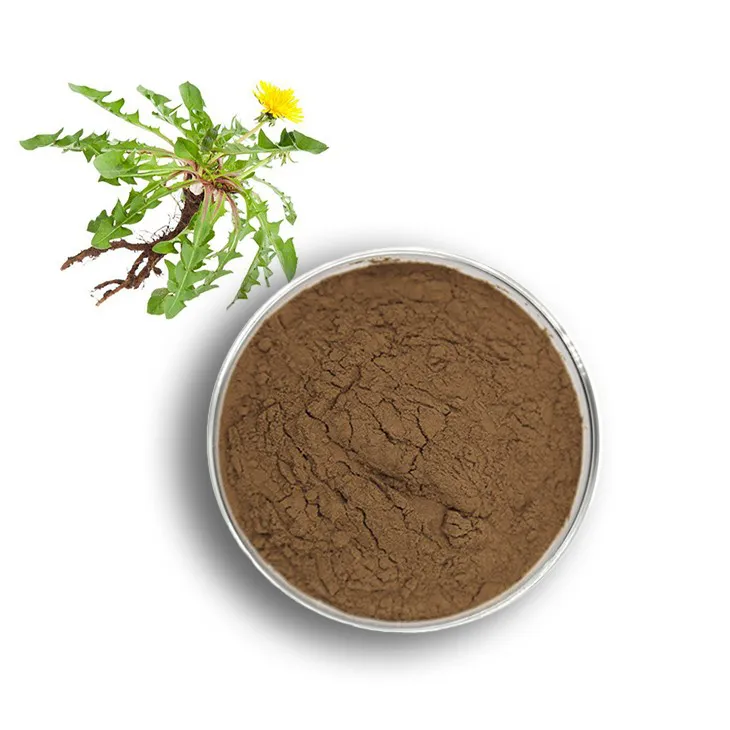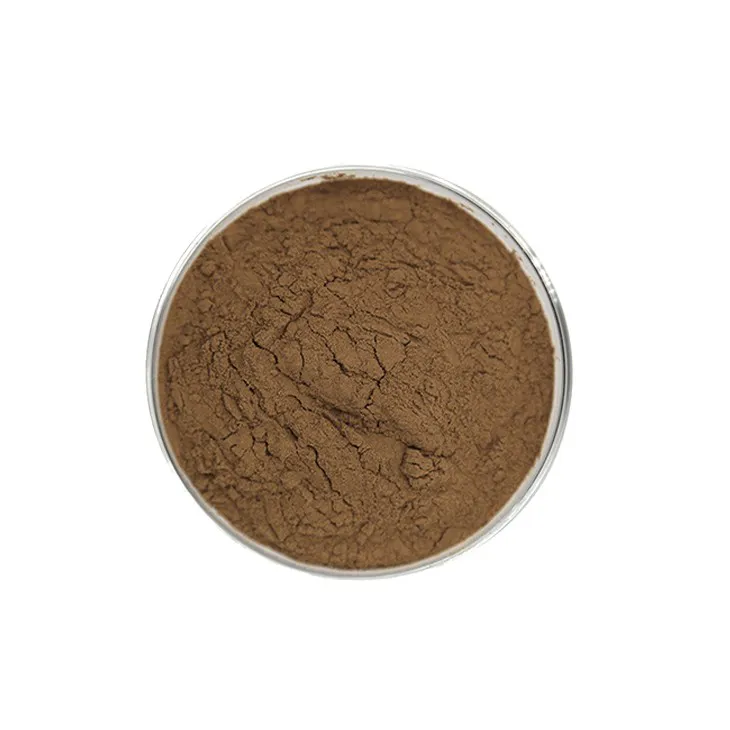- 0086-571-85302990
- sales@greenskybio.com
The flavor of mature dandelion roots and natural dandelion root extracts.
2024-11-14

1. Introduction
Dandelions, often regarded as common weeds, have been gradually recognized for their potential value in recent years. The mature dandelion roots and their natural extracts are of particular interest. Mature dandelion roots are rich in various compounds, and the extracts derived from them are also being explored for multiple applications. This article aims to delve into the mystery of their flavor, sensory profiles, pharmacological properties, and the relationship between the root and its extract.

2. Sensory Profiles of Mature Dandelion Roots
2.1 Taste
The taste of mature dandelion roots is complex. It has a certain degree of bitterness, which is characteristic of many medicinal plants. This bitterness is not overpowering but rather a distinct flavor note. Bitterness in dandelion roots can be attributed to the presence of various compounds such as sesquiterpene lactones. However, it also has a slightly earthy and nutty undertone. When tasted raw, the earthy flavor becomes more prominent, reminiscent of the soil in which the dandelion has grown. This earthy note gives it a natural and rustic flavor profile.
2.2 Aroma
The aroma of mature dandelion roots is equally interesting. It has a faint, herbal smell that is somewhat similar to other green, leafy plants. When the roots are dried, the aroma intensifies slightly. There is a subtle sweetness in the aroma that contrasts with the bitterness in taste. This combination of sweet - smelling aroma and bitter taste creates a unique sensory experience. The aroma can also be described as fresh and clean, with a hint of the outdoors, as if capturing the essence of the meadows where dandelions are commonly found.

3. Sensory Profiles of Natural Dandelion Root Extracts
3.1 Taste
Natural Dandelion Root Extracts, depending on the extraction method, can have a more concentrated taste compared to the raw roots. The bitterness is often more pronounced in the extract. However, if the extraction process is carefully controlled, some of the nuanced flavors of the root can also be retained. For example, the earthy and nutty undertones may still be present, although they may be overshadowed by the increased bitterness. In some cases, when the extract is used in the form of tinctures or concentrated solutions, a small amount of sweetener may be added to counterbalance the extreme bitterness, which allows for a more palatable consumption.
3.2 Aroma
The aroma of Dandelion Root Extracts is more concentrated as well. The herbal and fresh scent is magnified, and there may be additional notes that develop during the extraction process. These can include a slightly fermented or complex odor, especially if the extract is obtained through fermentation - based extraction methods. The sweet - smelling aspect of the aroma may be enhanced in some extracts, which can make it more appealing in terms of olfactory perception.

4. Pharmacological Properties of Mature Dandelion Roots
4.1 Diuretic Effects
Mature dandelion roots have been traditionally used for their diuretic properties. The compounds present in the roots, such as potassium salts, are thought to play a role in increasing urine production. This diuretic effect can be beneficial for individuals with certain health conditions, such as mild water retention. By promoting the excretion of excess water from the body, it may help in reducing swelling in the extremities and relieving some of the discomfort associated with fluid buildup.
4.2 Anti - inflammatory Properties
Research has suggested that dandelion roots contain anti - inflammatory compounds. Sesquiterpene lactones are among the components that may contribute to this effect. These compounds may help in reducing inflammation in the body, which is relevant for various health issues, including arthritis and some digestive disorders. Inflammation is a common underlying factor in many chronic diseases, and the anti - inflammatory properties of dandelion roots could potentially offer a natural approach to managing such conditions.
4.3 Digestive Aid
Dandelion roots are also known to have a positive impact on digestion. They can stimulate the production of digestive juices, including bile, which is essential for the proper breakdown and absorption of fats. Additionally, the roots may have a mild laxative effect, helping to promote regular bowel movements. This can be beneficial for individuals with sluggish digestion or constipation, as it helps to keep the digestive system functioning smoothly.
5. Pharmacological Properties of Natural Dandelion Root Extracts
5.1 Concentrated Benefits
Natural dandelion root extracts, due to their concentrated nature, can potentially offer more pronounced pharmacological effects compared to the raw roots. For example, the diuretic effect may be more significant in the extract, as the active compounds are more concentrated. This can be useful in situations where a stronger diuretic action is required. However, it also means that the extracts need to be used with more caution, as excessive consumption may lead to over - diuresis and potential electrolyte imbalances.
5.2 Standardization and Potency
One advantage of dandelion root extracts is the ability to standardize their potency. Through careful extraction and quality control processes, the amount of active compounds in the extract can be regulated. This is important for ensuring consistent pharmacological effects. For example, in the case of using the extract for its anti - inflammatory properties, a standardized extract can provide a more reliable dosage and efficacy. Standardization also allows for better comparison between different products in the market, enabling consumers to make more informed choices.
5.3 Bioavailability
The extraction process can also affect the bioavailability of the compounds in dandelion roots. Some extraction methods may enhance the absorption of the active ingredients in the body, making them more bioavailable. This can lead to improved pharmacological effects. For instance, if the anti - inflammatory compounds in the dandelion root extract are more easily absorbed, they can more effectively target the inflamed tissues in the body, providing better relief.
6. The Relationship between the Root and its Extract
6.1 Chemical Composition
The chemical composition of the dandelion root is the basis for its extract. The extract is obtained by isolating and concentrating certain compounds present in the root. For example, the sesquiterpene lactones, which are important for the pharmacological properties of the dandelion root, are also present in the extract. However, the extraction process may also introduce some changes in the chemical composition. Some compounds may be more selectively extracted, while others may be lost or modified during the process. This can affect the overall properties of the extract compared to the raw root.
6.2 Sensory and Pharmacological Correlation
There is a correlation between the sensory profiles and the pharmacological properties of the root and its extract. The bitterness in both the root and the extract, for instance, may be related to the presence of certain active compounds that also contribute to the pharmacological effects. The earthy and herbal aromas may also be associated with the compounds that have pharmacological activities. Understanding this correlation can help in the development of products that balance both the sensory and pharmacological aspects. For example, in the development of dandelion - based herbal supplements, efforts can be made to retain the beneficial compounds while minimizing the off - putting bitterness to improve consumer acceptance.
7. Conclusion
In conclusion, mature dandelion roots and their natural extracts possess unique sensory profiles and pharmacological properties. The complex taste and aroma of the roots and extracts offer a distinct experience. Their pharmacological properties, including diuretic, anti - inflammatory, and digestive - aid effects, make them potentially valuable in various health applications. The relationship between the root and its extract is crucial, as it determines the quality and effectiveness of the final product. As research on dandelions continues to progress, there is great potential for further exploration and utilization of these natural resources. Whether it is for the development of herbal remedies, functional foods, or other applications, understanding the flavor and properties of mature dandelion roots and their extracts is essential for those interested in harnessing the dandelion's potential.
FAQ:
What are the main components contributing to the flavor of mature dandelion roots?
The flavor of mature dandelion roots is mainly contributed by various compounds. There are some bitter - tasting substances like sesquiterpene lactones. Additionally, it may also contain phenolic compounds which can add a certain earthy and slightly astringent note to the overall flavor profile.
How is the natural dandelion root extract obtained?
The natural dandelion root extract is typically obtained through processes such as solvent extraction. Commonly, solvents like ethanol or water can be used. The roots are first cleaned and then macerated in the solvent. After a period of extraction, the solvent is removed, usually through evaporation, leaving behind the concentrated dandelion root extract.
What are the pharmacological properties of mature dandelion roots?
Mature dandelion roots have several pharmacological properties. They are known for their diuretic effects, which can help in increasing urine production. They also have antioxidant properties due to the presence of certain phenolic compounds. Moreover, some studies suggest that they may have anti - inflammatory effects, which could be beneficial for various health conditions.
How does the flavor of the natural dandelion root extract compare to that of the mature dandelion root?
The flavor of the natural dandelion root extract is generally more concentrated compared to the mature dandelion root. Since the extract is a concentrated form, the bitter and earthy flavors are more pronounced. However, the basic flavor components are similar, with the extract having a stronger and more intense taste due to the removal of a significant amount of water and other non - active substances during the extraction process.
Can the flavor of mature dandelion roots be modified for different applications?
Yes, the flavor of mature dandelion roots can be modified for different applications. For example, in the food industry, it can be combined with other ingredients like sweeteners or spices to balance out the bitterness. In the case of herbal preparations, it can be processed in certain ways, such as encapsulation, which can also affect the perception of the flavor when consumed.
Related literature
- The Chemical Composition and Pharmacological Properties of Dandelion Roots"
- "Flavor Profiles of Medicinal Roots: A Case Study of Dandelion"
- "Extraction Techniques and Quality Analysis of Dandelion Root Extracts"
- ▶ Hesperidin
- ▶ citrus bioflavonoids
- ▶ plant extract
- ▶ lycopene
- ▶ Diosmin
- ▶ Grape seed extract
- ▶ Sea buckthorn Juice Powder
- ▶ Beetroot powder
- ▶ Hops Extract
- ▶ Artichoke Extract
- ▶ Reishi mushroom extract
- ▶ Astaxanthin
- ▶ Green Tea Extract
- ▶ Curcumin Extract
- ▶ Horse Chestnut Extract
- ▶ Other Problems
- ▶ Boswellia Serrata Extract
- ▶ Resveratrol Extract
- ▶ Marigold Extract
- ▶ Grape Leaf Extract
- ▶ blog3
-
High purity olive leaf extract
2024-11-14
-
Lavender oil extraction method
2024-11-14
-
100% organic virgin sea buckthorn fruit oil
2024-11-14
-
Lotus leaf extract powder factory in China
2024-11-14
-
China aged garlic extract supplier
2024-11-14
-
Deer antler extract powder manufacturer
2024-11-14
-
Saw palmetto extract vs whole herb
2024-11-14
-
Grapefruit Seed Extract Powder
2024-11-14
-
Beetroot Powder
2024-11-14
-
Ginger Extract
2024-11-14
-
Lemon Extract
2024-11-14
-
Plantain extract
2024-11-14
-
Aminolevulinic acid
2024-11-14
-
Motherwort Extract
2024-11-14
-
Europen Bilberry Extract
2024-11-14
-
Wheat Germ Extract
2024-11-14
-
Polygonum Cuspidatum Extract
2024-11-14





















